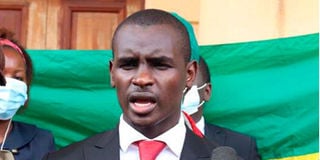Premium
Lobby loses bid to have suspected sexual offenders get free lawyers

Lawyer Shadrack Wambui of the Sheria Mtaani Na Shadrack Wambui group.
The High Court has rejected a request by a rights group seeking a declaration that suspected sexual offenders are entitled to mandatory legal representation.
The group, Sheria Mtaani Na Shadrack Wambui, sought the ruling on the grounds that some sexual offences are so serious that they attract the maximum sentence of life imprisonment.
It also argued that sexual offences are complex cases that involve expert witnesses like doctors who testify using medical terminology.
But Justice Anthony Mrima said there is a danger in granting the orders, arguing that the orders would be too general and usurp the role of the National Legal Aid Service as provided for in the Legal Aid Act (2016).
Though the constitutional requirement under Article 50(2)(h) assigns an accused person representation crystallised upon enactment of the Legal Aid Act in 2016, the right is not absolute, he said.
The decision to grant legal aid to any accused person rests solely with the National Legal Aid Service, he said, adding that the agency can refuse to grant the applicant the requested help.
“An accused person is required to make an application to the National Legal Aid Service for consideration. The Act does not, however, provide for compulsory legal representation of any special category of accused persons,” he said.
“It all rests upon the scheme to decide on whether it will admit an accused person to legal aid on a case-by-case basis.”
The National Legal Aid Service is mandated with providing legal services to indigent, marginalised and vulnerable persons.
In the petition, the group was aggrieved by the plight of people convicted of offences like rape, attempted rape, sexual assault, defilement of a child less than 11 years, gang rape, incest and deliberate transmission of HIV or any other life-threatening sexually transmitted disease.
The group argued that such people face life imprisonment without the possibility of remission despite behaviour change and good conduct, but they are not accorded free legal representation.
“The unrepresented sexual offender is always up against witnesses that include experts and seasoned doctors that he is supposed to cross-examine, which is an art that is studied over years and used to establish the truth and eliminate witness exaggeration or lies,” said the group’s lawyer, Shadrack Wambui.
He told the court that it is unfair when an offender facing life imprisonment argues his case without a lawyer against a State prosecutor who undoubtedly has a wealth of experience, knowledge and expertise.
He contended that the harsh nature of the punishment as prescribed under the Sexual Offences Act makes it necessary that care be exercised during the trial in order to avoid procedural or substantive errors that would cause substantial injustice to the accused.
He drew the court’s attention to data compiled by the Office of the Director of Public Prosecutions for the financial years 2017/2018, 2018/2019 and 2019/2020 which indicate that about 86.62 per cent of cases reported and prosecuted in Kenya related to sexual offences.
The court heard that as a result of lack of legal representation, the report indicates that 12 persons pleaded guilty to the offence of rape and one for the offence of attempted rape. It also indicates 110 of the sexual offenders pleaded guilty to the charge of defilement, one to gang rape, 21 to incest and 12 to sexual assault.
Judge Mrima, however, ruled that while legal representation is a qualified constitutional right, a court before whom an unrepresented accused person is arraigned only has the duty to promptly inform him or her of the right to choose and be represented by an advocate.
“For the right to legal representation to be firmly embedded in Kenya, it is incumbent upon courts to ensure that the right is promptly and sufficiently explained to the unrepresented accused persons and that any necessary assistance is accorded to such accused persons towards seeking the representation,” he said.
The only offenders entitled to mandatory legal representation at the State’s expense are murder suspects and children. The judge observed that it is not discriminative for the law to deny other categories of offenders free representation.





